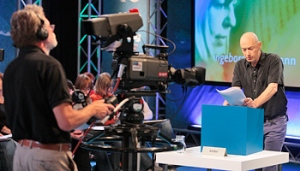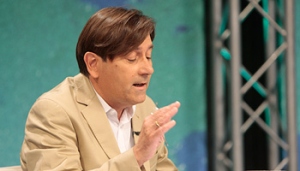 Ralf Bönt (Bild: ORF/Johannes Puch)
Ralf Bönt (Bild: ORF/Johannes Puch)
Bönt enters the race as a favourite
Ralf Bönt’s “Fotoeffekt” (Photo effect) is the second text of the second morning of readings: Meike Feßmann proposed the author from Berlin for the competition. The majority of the jury members were fascinated by the text – a first favourite?
Bönt’s novella excerpt tells the story of physicists Michael Faraday and Heinrich Hertz from the unusual perspective of a light particle. The story is about electromagnetism, mercury vapours and the errors and the victims of science.
 Publikum (Bild: ORF/Johannes Puch)
Publikum (Bild: ORF/Johannes Puch)
A “daring narrator” according to Keller
“We are dealing with a kamikaze here”, Hildegard E. Keller noted with reference to the “narrator photon”. “There are narrators who are great, there are those who are bold – and then there are daring ones” – here, an I is constructed whose identity comes to light only at the end. “A rabbit that the author magically produces out of a hat.” The only objection: “The question is: how soon should something like that be announced in a text.”
 Hildegard E. Keller (Bild: ORF/Johannes Puch)
Hildegard E. Keller (Bild: ORF/Johannes Puch)
Of giddiness, time levels and incoherences
“I have fallen victim to the giddiness mentioned in the text”, Paul Jandl confessed: “I don’t know what the text is trying to tell me.” The different time levels are “forced onto each other”, he believes, the language is full of “off-key symbolism” and “incoherences”.
Much sloppy and false symbolism
Karin Fleischanderl was also not convinced after Bönt’s reading: “This language operates with empty meanings. The sentences shine superficially, but the intended profoundness does not withstand closer inspection.” Meaning is sacrificed to the “precious”. What’s more, there is “much sloppy and false symbolism” and “rule breaking” that has “no added poetic value”. “Too dolled up, the whole thing”, was her overall judgement.
 Ralf Bönt (Bild: ORF/Johannes Puch)
Ralf Bönt (Bild: ORF/Johannes Puch)
Feßmann explained
Heike Feßmann then tried to put some order into things: the chosen narrative perspective makes it clear why the text and its narrator can be in all places at once: the lives of the two scientists – one in Hamburg, the other in London – become interconnected this way.
“A modern version of the selling-your-soul-to-the-devil story”
Ijoma Mangold is one of the proponents of the text: “The fact that I do not understand everything about a text always means that I have a positive attitude towards it.” He is “very impressed” by Bönt’s text. The only criticism would be that he follows into the footsteps of Daniel Kehlmann. But this new genre, “science literature”, has much to offer. “I see this as a modern version of the selling-your-soul-to-the-devil story on the level of materialism: the mercury brings the truth to light, but at the same time, the discoverer finds himself in the twilight.” This text is “precious”, in the suspenseful sense of the word.
Spinnen expressed himself with caution
Burkhard Spinnen found himself on the side of the careful supporters; he considered the perspective of the “photon” “superb” and “outrageous”. The history of 19th century science in particular is interesting, he believes, because it tells us much about “how we came to be a society like this, which minds and bodies we originated from”. His main point of criticism: “I don’t like this attitude of making use of historical material whichever way you like – along the lines of ‘I am the man’.” Spinnen further criticised that “I always have to do what the text tells me to do, I seem to just scuttle along behind.”
 Alain Claude Sulzer (Bild: ORF/Johannes Puch)
Alain Claude Sulzer (Bild: ORF/Johannes Puch)
Sulzer was “happy to be seduced”
Alain Claude Sulzer also liked the text: “The story the text tells is written so elegantly that I believe everything and I am happy to be seduced by this narrator.” The reader can cope with minor mistakes such as wrong ages, Sulzer believes.
translated by expectTranslations